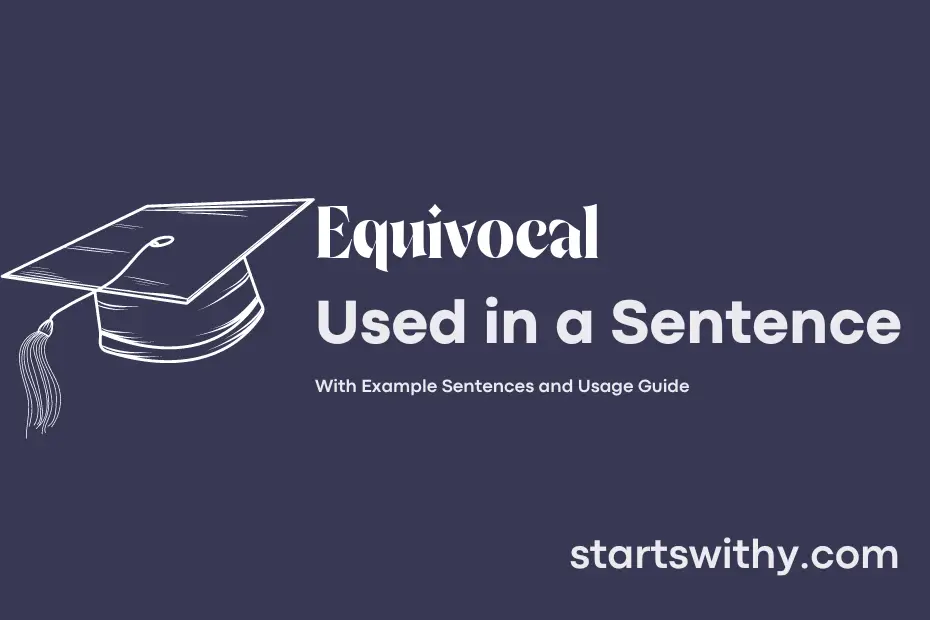Have you ever come across a sentence that left you puzzled about its intended meaning? In the world of language and communication, equivocal sentences can often be the cause of this confusion.
An equivocal sentence is one that has multiple possible interpretations or meanings, making it unclear or ambiguous to the reader or listener. This lack of clarity can lead to misunderstandings or miscommunication, highlighting the importance of precision in language usage.
7 Examples Of Equivocal Used In a Sentence For Kids
- Equivocal means something is not clear.
- A riddle may have an equivocal answer.
- Sometimes words can be equivocal and have different meanings.
- It’s okay to ask if something is equivocal.
- These magic tricks have an equivocal outcome.
- The mystery book has an equivocal ending.
- The teacher will help us understand what equivocal means.
14 Sentences with Equivocal Examples
- The professor’s explanation was equivocal, leaving the students confused about the assignment requirements.
- The results of the experiment were equivocal, prompting the students to repeat the procedure for more accurate data.
- The college’s announcement about the upcoming exams was rather equivocal, causing uncertainty among the students regarding the exam schedule.
- The feedback from the guest lecturer was equivocal, making it difficult for the students to gauge their performance in the presentation.
- The group discussion on the new campus policy was equivocal, with students expressing mixed opinions on its implications.
- The research findings presented at the seminar were somewhat equivocal, requiring further analysis to draw clear conclusions.
- The professor’s response to the student’s query was equivocal, leading to a debate among classmates on the correct interpretation of the concept.
- The guidance provided by the career counselor was equivocal, leaving the students uncertain about their future career paths.
- The study abroad program details were equivocal, causing hesitation among students about applying for it.
- The campus club’s decision on the event planning budget was equivocal, resulting in a reevaluation of the expenses by the student committee.
- The candidate’s stance on campus reform was equivocal, creating a divide among students on whether to support the proposed changes.
- The instructions for the group project were somewhat equivocal, leading to different interpretations among team members.
- The debate competition judges’ criteria for scoring were equivocal, prompting students to seek clarification before the event.
- The seminar on time management strategies offered equivocal advice, leaving students unsure about which method to follow for better productivity.
How To Use Equivocal in Sentences?
To Equivocal means to be open to more than one interpretation or ambiguous. When using Equivocal in a sentence, it’s important to remember its meaning so that you convey ambiguity or uncertainty.
One way to use Equivocal in a sentence is: “Her response to the question was so equivocal that we couldn’t determine her true feelings.” In this example, equivocal is used to describe a response that is unclear or open to interpretation.
Another example could be: “The witness gave an equivocal statement, leaving the jury puzzled about what really happened.” Here, Equivocal is used to describe a statement that lacks clarity and leaves room for doubt.
Remember that when using Equivocal in a sentence, you are essentially describing something that is not definitive or straightforward. It is a useful word to convey uncertainty or ambiguity in writing or speech.
Practicing using Equivocal in different sentences can help you become more comfortable with its meaning and how to incorporate it effectively. Keep in mind the context in which you are using the word to ensure that it fits appropriately and conveys the intended message clearly.
Conclusion
In conclusion, sentences with equivocal meanings can lead to confusion and misinterpretation due to their unclear or ambiguous nature. These sentences often allow room for multiple interpretations, making it difficult for the reader or listener to grasp the intended message. Ambiguity in communication can result in misunderstandings, disagreements, and frustration among individuals involved in the conversation.
To avoid miscommunication, it is essential to use clear and straightforward language in order to convey messages effectively. By eliminating ambiguity and ensuring that sentences are unambiguous, individuals can promote better understanding and enhance the quality of their communication. Clear and precise language not only helps in conveying thoughts accurately but also fosters smoother interactions and relationships.



